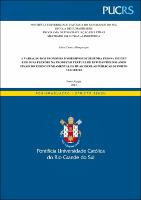| Share record |


|
Please use this identifier to cite or link to this item:
https://tede2.pucrs.br/tede2/handle/tede/11285| Document type: | Dissertação |
| Title: | A variação dos pronomes possessivos de segunda pessoa teu/seu e de suas flexões na produção textual de estudantes dos anos finais do ensino fundamental de duas escolas públicas de Porto Alegre/RS |
| Author: | Albuquerque, Salete Dossa  |
| Advisor: | Brescancini, Cláudia Regina |
| Abstract (native): | Este estudo investiga a variação dos pronomes possessivos de segunda pessoa teu/seu e de suas flexões em redações de alunos de duas escolas públicas de Porto Alegre/RS, à luz da Teoria da Variação (Labov, 2008 [1972]; Weinreich; Labov; Herzog, 2006 [1968]). Tem por objetivo principal identificar os fatores linguísticos e extralinguísticos que exercem influência sobre o uso variável do pronome teu e de suas flexões. O corpus investigado é constituído por 2.174 ocorrências de teu/seu e suas flexões, extraídas de 550 redações produzidas por 190 estudantes matriculados nos anos finais do Ensino Fundamental (do 6° ao 9° ano). As variáveis linguísticas consideradas são paralelismo formal, animacidade, generalidade do referente, alternância do pronome tu/você e alternância dos possessivos teu/seu nos textos escritos. As variáveis extralinguísticas são gênero, ano escolar do Ensino Fundamental II, escola, distorção, instrumento, idade e informante. Após estratificadas, as ocorrências foram submetidas ao software R, por meio da interface RStudio. Os resultados apontam a baixa ocorrência de teu e suas flexões, com taxa de 6,5% (141 ocorrências), e a preferência pelo uso de seu e suas flexões, com taxa de 93,5% (2.033). A regressão logística revelou como estatisticamente significativas para a realização de teu e suas flexões as variáveis paralelismo formal, alternância de pronome pessoal nos textos, instrumento de coleta e idade. Os resultados obtidos revelaram o papel condicionador dos pronomes paralelos quando em um mesmo período. As ocorrências, ao longo do texto, apenas do pronome pessoal tu ou da alternância dos pronomes tu e você também favorecem a probabilidade de ocorrência de teu e suas flexões em comparação com o uso isolado do pronome você. Observou-se ainda uma correlação positiva entre a idade do participante e a ocorrência de teu e suas flexões. Quanto aos instrumentos, as propostas de carta ao amigo e carta ao ídolo mostram-se favorecedoras, o que parece sinalizar para o fato de que os participantes associaram a noção de proximidade à variante teu e às suas flexões. |
| Abstract (english): | This study investigates the variation of the second-person possessive pronouns “teu” and “seu” and their inflections in essays written by students from two public schools in Porto Alegre, Rio Grande do Sul, in light of the Variation Theory (Labov, 2008 [1972]; Weinreich; Labov; Herzog, 2006 [1968]). Its main objective is to identify the linguistic and extralinguistic factors that influence the variable use of the pronoun “teu” and its inflections. The corpus under investigation consists of 2,174 occurrences of “teu/seu” and its inflections extracted from 550 essays written by 190 students enrolled in the final years of Elementary School (from the 6th to the 9th grade). The linguistic variables considered include: formal parallelism, animacy, generality of the referent, pronoun alternation “tu/você”, and alternation of possessives “teu/seu” in the written texts. The extralinguistic variables include: gender, grade level in Elementary School II, school, distortion, instrument, age, and informant. After stratification, the occurrences were analyzed using the R software through the RStudio interface. The results indicate a low occurrence of the possessive “teu” and its inflections, with a rate of 6.5% (141 occurrences), and a preference for the use of “seu” and its inflections, with a rate of 93.5% (2,033). Logistic regression revealed that the statistically significant variables for the use of “teu” and its inflections include formal parallelism, alternation of personal pronouns in the texts, collection instrument, and age. The results obtained reveal the conditioning role of parallel pronouns when in the same sentence. Occurrences of only the personal pronoun “tu” or the alternation between “tu” and “você” also favor the probability of the occurrence of “teu” and its inflections compared to the isolated use of “você”. Furthermore, a positive correlation was observed between the participant’s age and the occurrence of “teu” and its inflections. Regarding the instruments, the proposed letters to a friend and letters to an idol are favorable, indicating that participants associated the notion of proximity with the “teu” variant and its inflections. |
| Keywords: | Sociolinguística Pronomes Possessivos de Segunda Pessoa Paralelismo Formal Sociolinguistics Second-Person Possessive Pronouns Formal Parallelism |
| CNPQ Knowledge Areas: | LINGUISTICA, LETRAS E ARTES::LETRAS |
| Language: | por |
| Country: | Brasil |
| Publisher: | Pontifícia Universidade Católica do Rio Grande do Sul |
| Institution Acronym: | PUCRS |
| Department: | Escola de Humanidades |
| Program: | Programa de Pós-Graduação em Letras |
| Access type: | Acesso Aberto |
| Fulltext access restriction: | Trabalho não apresenta restrição para publicação |
| URI: | https://tede2.pucrs.br/tede2/handle/tede/11285 |
| Issue Date: | 28-Sep-2023 |
| Appears in Collections: | Programa de Pós-Graduação em Letras |
Files in This Item:
| File | Description | Size | Format | |
|---|---|---|---|---|
| Salete Albuquerque_Dissertação Finalizada - FICHA CATALOGRÁFICA EM PDF.pdf | SALETE DOSSA ALBUQUERQUE_DIS | 1.4 MB | Adobe PDF |  Download/Open Preview |
Items in DSpace are protected by copyright, with all rights reserved, unless otherwise indicated.




